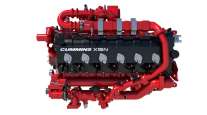Managing Editor
Natural Gas Pricing, Performance Are Key Issues for Fleets
ARLINGTON, Va. — Some of the nation’s leading trucking executives at American Trucking Associations’ Summit on Natural Gas in Trucking said that with natural gas priced as much as $2 per gallon cheaper than diesel fuel, it can’t be ignored as an alternative fuel.
The lower fuel price is giving the U.S. trucking industry its greatest opportunity to run a more cost-effective business, but concerns ranging from infrastructure to maintenance are forcing them to proceed slowly, fleet executives said at a panel discussion Friday.
And U.S. natural gas prices are expected to remain significantly lower than diesel — which has averaged just below $4 per gallon for the past two years — primarily because of the plentiful domestic supply. U.S. domestic supplies can meet demand for a century, according to projections.
With that kind of potential savings, executives of carriers Lynden Inc., Swift Transportation and UPS Inc. have all considered boosting natural gas use for their fleets. They spoke Friday at a summit session, “The Business Case for Natural Gas Use: A Fleet Perspective.”
“We’re spending hundreds of millions a year for fuel, so that was a serious problem,” said Jim Bruce, UPS’ vice president of corporate public affairs.
The package carrier has a great deal of experience given the more than 1,400 alternative-fuel vehicles in its U.S. fleet. As early as 1989, UPS was using compressed natural gas vehicles and by 2000 had added liquefied natural gas vehicles. Today, it has 933 CNG and 93 LNG vehicles.
“Natural gas is a viable option [and] we prefer LNG,” Bruce said.
LNG — which requires natural gas to be cooled to at least minus 260 degrees Fahrenheit — is seen as providing more power to heavy-duty trucks making longer hauls, summit speakers said.
“There are CNG options for Class 8 if you can stack the cylinders on the back and we’re looking at that” as well, Bruce added.
While Jerry Moyes, CEO of Swift Transportation, agreed that natural gas improves overall cost efficiencies, he was not completely sold on its overall value.
“We’re being asked to pay $100,000 extra for these trucks,” he said, noting that the reduced torque and fairly common engine technology doesn’t justify the cost, especially considering how frequently Swift Transportation turns over its fleet.
“We run 16,000 trucks and trade them every four years. We’ve got to know what the resale value is. It’s a big unknown,” he said.
Lynden Inc., Anchorage, Alaska, has yet to try natural gas in its trucks, but Anna Deal, coordinator of the company’s green initiatives, said it is an attractive possibility, noting it is a cleaner-burning fuel.
In a joint project between Lynden and the National Energy Policy Institute, Lynden found such pros as a minimum of about 70,000 miles per truck per year would yield a 20% return on investment and barriers that included the additional weight of fuel tanks that detract from payload and revenue.
“The question is: When do the savings from the less-expensive natural gas outweigh all of the disadvantages?” Deal said.




